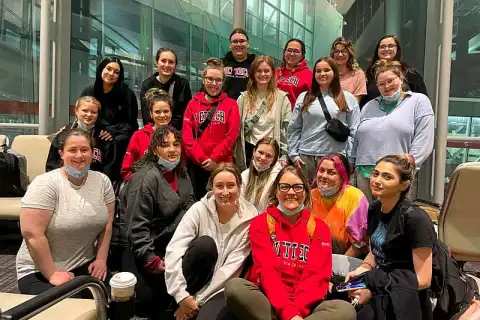Certificate - Artificial Intelligence
- 1 year
- Duration
- 22,849 CAD
- Price
- Rolling admission
- Start
- Rolling admission
- Deadline
- Certificate
- Degree
- Mixed
- Format
- Toronto / Canada
- Location
Program description
Benefit from AI's boundless potential and contribute to answering the most pressing issue confronting modern businesses: how can we decipher and capitalize on our data?
This postgraduate certificate program is designed for graduates of computer science, computer programming, and software development programs. It's eight months long and will teach you the theory and practical skills you need to help businesses make strategic decisions based on data.
Machine learning algorithms, cloud computing, data visualization, and advanced artificial intelligence (AI)—including generative AI and prompt engineering—are just a few of the essential topics covered in this curriculum. Additionally, a work-integrated learning experience is available to you as an elective that will provide you the chance to get experience in the field.
Program structure
Semester 1
- Machine Learning
- Artificial Intelligence
- Strategic Evidence Based Decision Making
- Cloud Computing for Machine Learning
- Advanced Data Visualization
- Data Preparation and Governance
Semester 2
- Capstone Project
- Computer Vision
- Deep Learning
- Natural Language Processing
- Robotics
Price
Tuition fees - 22,849 CAD
Books and Supply Costs - 270 CAD
Please note: All costs are approximate, may vary by campus and are subject to change at any time without notice.
Requirements for applicants
Academic Requirements:
- Postsecondary diploma or degree in computer programming, software development or a related discipline.
- Postsecondary diploma or degree in an unrelated discipline with two years of demonstrable software development/engineering experience (or completion of computer programming courses) may be considered. A resume and references must be provided.
- A minimum of three years of related work experience in computer programming or software development/engineering detailed in a professional resume with a letter of intent and references may be considered.
English Proficiency Requirements:
If English is not your first language, show one of the following:
- Minimum of two years full-time study in an English-speaking nation
- Minimum one year of full-time postsecondary education in an English-speaking nation
- Successful completion of an intense English program like the English Language Institute
- English proficiency exam results from one of the international testing agencies. Only two-year-old tests are valid.
English language test score requirements
- CAEL CE and CAEL online - Minimum 60
- Cambridge English Exams (B2 First/FCE, C1 Advanced/CAE or C2 Proficiency/CPE) - Minimum 169 with no skill below 162
- Duolingo - Minimum score 105 to 110
- IELTS Academic - Minimum 6.0 with no skill below 5.5
- PTE Academic - Minimum score 58
- TOEFL iBT (including MyBest TOEFL and Home Edition) - Minimum 80 with no skill below 20
- TOEFL Revised Paper Delivered - No skill below 20
About the university

A public institution with many campuses in Peterborough, Ontario, and the Greater Toronto Area is called Seneca College of Applied Arts and Technology. At the bachelor, diploma, certificate, and graduate levels, it provides both full-time and part-time programs.
Seneca has been involved in foreign education for many years and today draws over 10,000 students from over 130 different nations each year. Through intense language instruction that may last anywhere from two months to more than a year, Seneca's English Language Institute helps overseas students become ready for post-secondary education. The college has a number of alliances with schools abroad and is growing its efforts in collaborative applied research and work/study abroad opportunities.
Seneca in a Nutshell
- With 30,000 full-time students and more than 70,000 registrations for continuing education each year, this institution is among the biggest in Canada.
- 7,000 foreign students from more than 150 nations make up a diversified student body.
- In terms of connections to other postsecondary institutions, Ontario colleges rank first.
- In Toronto, York Region, and Peterborough, there are ten campuses.
- Every year, on average, 8,000 bursaries and 2,600 Seneca scholarships/awards are given out.





